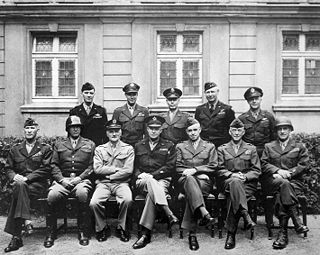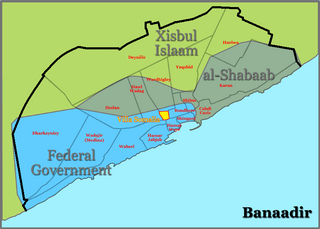Market forces are basic factors in a market economy.
It may also refer to:
- Market Forces , a novel by Richard Morgan
- "Market Forces", an episode of The Spectacular Spider-Man
Market forces are basic factors in a market economy.
It may also refer to:

A market economy is an economic system in which the decisions regarding investment, production, and distribution to the consumers are guided by the price signals created by the forces of supply and demand. The major characteristic of a market economy is the existence of factor markets that play a dominant role in the allocation of capital and the factors of production.

Operation Market Garden was an Allied military operation during the Second World War fought in the German-occupied Netherlands from 17 to 25 September 1944. Its objective was to create a 64 mi (103 km) salient into German territory with a bridgehead over the Nederrijn, creating an Allied invasion route into northern Germany. This was to be achieved by two sub-operations: seizing nine bridges with combined US and British airborne forces ("Market") followed by British land forces swiftly following over the bridges ("Garden").
Aggregation may refer to:

The European Theater of Operations, United States Army (ETOUSA) was a theater of Operations responsible for directing United States Army operations throughout the European theatre of World War II, from 1942 to 1945. It commanded Army Ground Forces (AGF), United States Army Air Forces (USAAF), and Army Service Forces (ASF) operations north of Italy and the Mediterranean coast. It was bordered to the south by the North African Theater of Operations, United States Army (NATOUSA), which later became the Mediterranean Theater of Operations, United States Army (MTOUSA).
Bengali or Bengalee, or Bengalese may refer to:

Porter's Five Forces Framework is a method of analysing the competitive environment of a business. It draws from industrial organization (IO) economics to derive five forces that determine the competitive intensity and, therefore, the attractiveness of an industry in terms of its profitability. An "unattractive" industry is one in which the effect of these five forces reduces overall profitability. The most unattractive industry would be one approaching "pure competition", in which available profits for all firms are driven to normal profit levels. The five-forces perspective is associated with its originator, Michael E. Porter of Harvard University. This framework was first published in Harvard Business Review in 1979.

Ledbury is a market town and civil parish in the county of Herefordshire, England, lying east of Hereford, and west of the Malvern Hills.

Chemical, biological, radiological, and nuclear defense or Nuclear, biological, and chemical protection is a class of protective measures taken in situations where chemical, biological, radiological, or nuclear hazards may be present. CBRN defense consists of CBRN passive protection, contamination avoidance, and weapons of mass destruction mitigation.
AFM may refer to:

LinkedIn is a business and employment-focused social media platform that works through websites and mobile apps. It was launched on May 5, 2003 by Reid Hoffman and Eric Ly. Since December 2016, LinkedIn has been a wholly owned subsidiary of Microsoft. The platform is primarily used for professional networking and career development, and allows jobseekers to post their CVs and employers to post jobs. From 2015, most of the company's revenue came from selling access to information about its members to recruiters and sales professionals. LinkedIn has more than 1 billion registered members from over 200 countries and territories.
PMF may stand for:

Sharing is the joint use of a resource or space. It is also the process of dividing and distributing. In its narrow sense, it refers to joint or alternating use of inherently finite goods, such as a common pasture or a shared residence. Still more loosely, "sharing" can actually mean giving something as an outright gift: for example, to "share" one's food really means to give some of it as a gift. Sharing is a basic component of human interaction, and is responsible for strengthening social ties and ensuring a person’s well-being.
KKK most commonly refers to the Ku Klux Klan, an American white supremacist group.
Bear trap or beartrap may refer to:
Squeeze or squeezing may refer to:
KST may refer to:
The Toyota Stallion is a nameplate used on three different pickup truck models by Toyota:
Market is a term used to describe concepts such as:

The Battle of Mogadishu (2010–11) began on 23 August 2010 when al-Shabaab insurgents began attacking government and African Union Mission to Somalia (AMISOM) positions in the Somali capital of Mogadishu. Al-Shabaab began its offensive after its spokesman said the group was declaring a "massive war" on troops sent by AMISOM, describing its 6,000 peacekeepers as "invaders". In December 2010 the number of AMISOM troops was increased to 8,000 and later to 9,000. The battle's name usually includes the years, when referenced, in order to distinguish it amongst the nine major Battles of Mogadishu during the decades long Somali Civil War.
Bofors 40 mm gun is a name or designation given to models of 40 mm calibre automatic anti-aircraft guns designed and developed by the Swedish company Bofors: